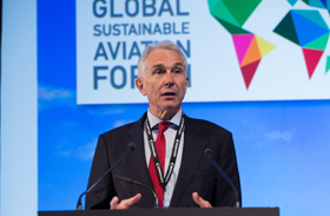
Good afternoon everyone, and my thanks to Michael and all the ATAG team for their superb organization of this event, as always. And thanks to all the speakers before me, who have demonstrated the fervor and depth of commitment to sustainability that is shared across all aspects of our industry.
I believe that mood is also shared among our partners in governments.
I know that predicting the future is always a risky business. But I am going to stick my neck out and say the signs are encouraging that governments will achieve an agreement for a global market-based measure (GMBM) in September. That is certainly the result that the industry is counting on.
My optimism is based on more than mood. The hard work over recent months has resulted in a concrete proposal for a global carbon-offsetting scheme. That is a significant step forward, and not just because we can now swap one slightly unclear acronym – GMBM – for one that is a little more precise: COSIA – the Carbon Offset Scheme for International Aviation.
There are many unanswered questions about the COSIA. But it has the potential to meet the critical capabilities. We must have a practical, transparent, fair and environmentally-credible scheme. And that scheme must be implementable by 2020—in time to achieve our commitment to carbon neutral growth from 2020.
That’s the big picture global hope of the industry. So let’s fix that in place even before we address questions of cost and complexity which will most certainly take time to iron out.
These fundamental tenets point to our commitment to quality. We need carbon-reduction credits that result in real and permanent reductions of CO2 in the atmosphere, over and above business-as-usual improvements. It means that we will accept certain forest-preservation credits, because we believe forestry destruction to be one of the worst contributors to climate change.
It means accepting there is a cost for sustainability. But a market-based cost will be much more efficient and fair than the alternative – a patchwork of inefficient and ineffective charges and taxes, cooked up to raise cash, not to tackle climate change. We expect the cost will be not insignificant, but manageable–and I think that would be the right balance.
I am under no illusion that reaching an agreement will be easy. Airlines would prefer COSIA to apply as equally as possible to carriers across the world, to minimize market distortions. We also recognize that situations vary from airline to airline---as does the perception (or even reality) of what is truly fair.
ICAO is suggesting a two-phase implementation, to address the concerns of less wealthy nations with small air transport sectors. They don’t want to be penalized for the historic carbon emissions of the developed world. It is an important and understandable view. Indeed, a two-stage proposal may be feasible if the lines are drawn carefully.
Finally, I want to emphasize the strength of our support for an agreement. International aviation is fully committed to reaching the challenging goals that we have agreed with governments. We are leaving no stone unturned in this effort.
COSIA is one of four pillars in a strategy that also includes achieving better environmental performance with improved technology, operations and infrastructure. As you have heard from Kurt, Angela, David and Jeff, each sector of our industry is making significant progress. The industry is doing all it can. And we need governments to enable us further with an agreement at the 39th ICAO Assembly.
At the ATAG Summit last year, I put aviation’s environmental work in the context of the wider benefits aviation delivers as a ‘force for good’. Economic growth and social development tend to drive higher aspirations in terms of environmental responsibility and sustainability. And that growth and development is powered by global air connectivity. So we must continue to save the earth by taking to the air. My message to the ICAO member states is simple. The industry is resolute. We are determined to do the right thing in mitigating our climate change impact. We are counting on the 191 member states of ICAO to enable that important result by reaching an agreement later this year.
Thank you.